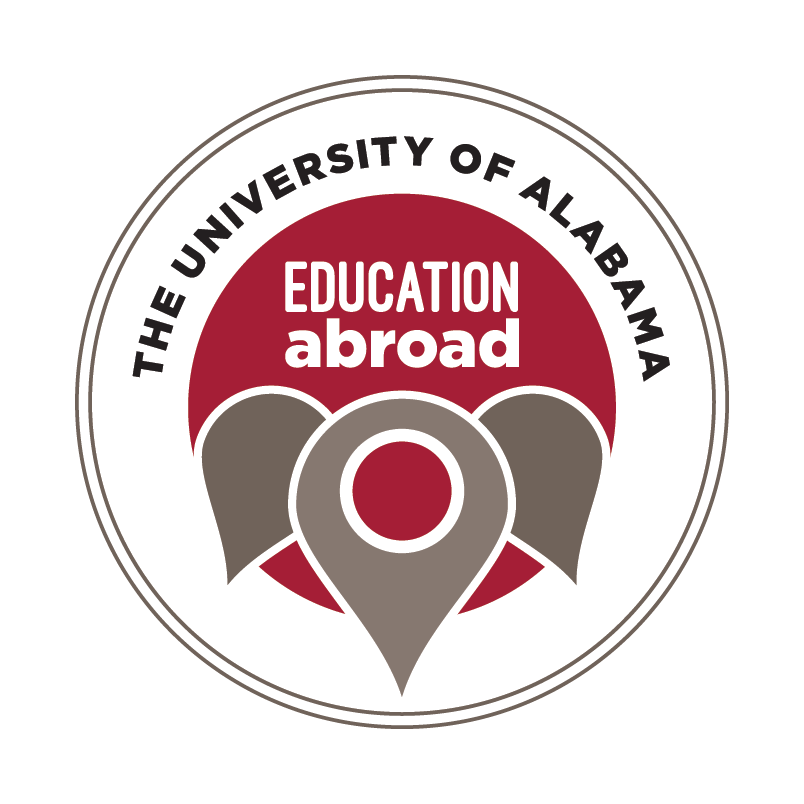I have been waiting my whole life for an opportunity like this to work internationally. For the past two years, I have been counting the days until I could get to Ghana. This program is why I stayed with the University of Alabama for grad school. And now that I am here, I could not be more thrilled. Everyone has been so lovely and helpful. The people of Ghana are so service-oriented and hospitable. That was evident from the first person who helped me by buying me water at the airport because the vending machine credit card reader wasn’t working, and I had no Cidi’s (Ghana money) yet.
For the first few days, my cohort adjusted to being here. Unfortunately, I got food poisoning from the plane meal, so my first 24 hours here were a bit rough, especially with the adjustment to the heat. Cold showers are my new best friend, but you do get used to the heat after a while. Once the food poisoning passed, I was able to really appreciate the beauty of the African countryside and the slower lifestyle. It is so peaceful, and the topography is stunning. No one is in a rush like in the US, except in traffic; traffic here is hectic. Another adjustment was the sun. Being close to the equator, the sun comes up at 6 am and goes down at 6 pm every day, year-round. So, I have been adjusting to early morning and early nights because being out at night is not an option for my safety.
Communicating here is easy, although some people are easier to understand than others. English is the language of business and education in Ghana, which had been colonized by England. They gained their independence in 1957 and have never experienced a civil war. The people take pride in their peace elections which run on the same four-year cycle as the US with a new president coming into office this year.
There are over 50 tribal languages and 70 dialects. The most common indigenous language is Twi, and I am trying to learn some, but I was not gifted with the art of speaking other languages with ease. One thing I have learned is that the day of the week you were born is important, and each day has a name for each gender. As a girl born on a Friday, I am Afia (aa-fae-aa). So, some call me Caeli Afia (Caeli Friday born). I have also learned that my accent is hard for them to understand, so I need to talk slower. I have never thought about how my accent would be hard for people to understand because my accent is fairly genetic for America, but that is in America. Of course, my accent would be hard for them to understand.
On our first weekend here, we, as a cohort, went to the city of Accra to shop for the things we had not brought and to soak up some A/C at a hotel. Accra is the capital of Ghana and is a large metropolitan area. My list of things to do there is never-ending, and I can’t wait to explore more on the weekends. We did have a minor hiccup at the hotel, as I accidentally flooded the shower, which was not my finest moment. Water went all the way out to the hall. To top it off, I shower at night, so it was super late when it got fixed, and my poor roommate had to wait a long time for her turn to bathe.
We have the sweetest man as our taxi driver and are now his regular Friday and Sunday customers as he drives us nearly 2 hours each way to Accra and back. He told me how much he appreciates our business, and I could not be more thankful for his time and his protective nature over us.
When we returned from Accra, our internships began. I am working with the City of Refuge Ministry (CORM). This is a fantastic internship placement for a social worker. They have a whole team of social workers called the Impact One Team. Together, they help students, families, and the community. CORM is a faith-based organization whose goal is to help end child trafficking. Most of the children in the orphanage are survivors of trafficking, but others are here due to abuse and/or neglect. CORM is a multifaceted machine. It is an orphanage catering to children who have been rescued from human trafficking, as well as a school for the orphanage and the local community. CORM also hosts programs to empower the community, especially single mothers, by providing them with a skill or through micro-loans to start a business. Everything they do goes back to ending child trafficking and empowering the community.
The story of many of these children is the same. Their single mothers in Tema give up their children to the boat masters at Lake Volta. They are promised their children will receive regular meals, clothes, and an education. However, none of that is happening. Boys of all ages are used for hard labor, from sun up to sun down, 12-14 hours a day. The girls are used for labor, too, but are primarily being sex trafficked.
By having programs to help the community and to educate single mothers about a trade, they are working to prevent that from happening so that these mothers can care for their families and not be put into a situation to give up their children.
